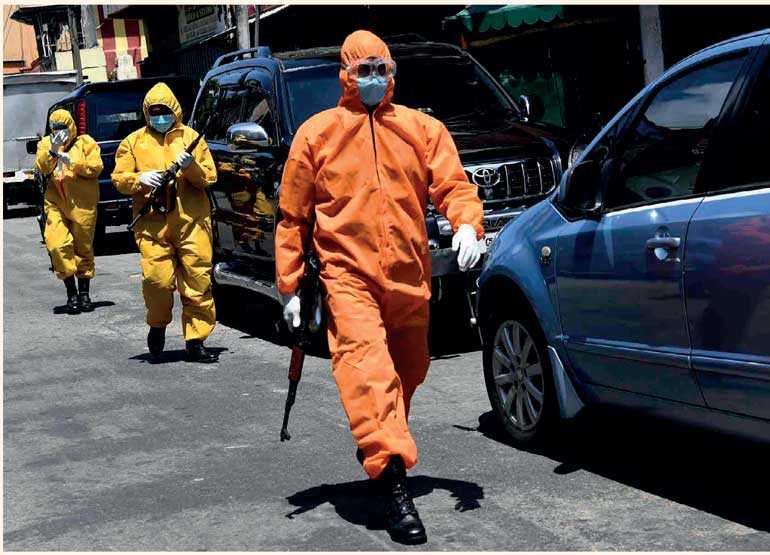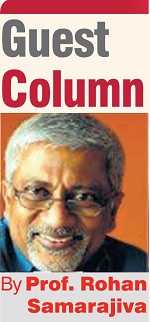Wednesday Feb 25, 2026
Wednesday Feb 25, 2026
Friday, 24 April 2020 00:00 - - {{hitsCtrl.values.hits}}

As I let the contending views on how and when the General Election should be held wash over me, I am comforted by the fact that most participants in the conversation cite provisions from the Constitution. Those arguing that the Constitution is silent on the specific question before us, including the Elections Commission, want the Supreme Court to give a solution. In all, good signs that constitutionalism has not been abandoned. 
Constitutionalism is respect for words on paper that say what power holders can and cannot do; it is basically about the widespread respect for law; it is at the core of rule of law. In an essay I wrote just before the 2010 Presidential Election and then twice in 2015, just before the Presidential Election and then in a reflection on the Election and the subsequent 19th Amendment, I described the Sri Lankan polity as being torn between the default Kandyan feudal mindset and Constitutionalism. In 2010 we went one way and in 2015 the other way. Where will we end up in 2020?
Ending the impasse
The references to Articles of the Constitution by proponents of holding elections before the country returns to normalcy is obviously a good thing. It indicates that they place weight on what the Constitution says various entities can and cannot do. One hopes that the independent Election Commission will be able to navigate the rough waters ahead. They wished to seek guidance from the Supreme Court on the unanticipated situation the country finds itself in. But only the President can seek such interpretations according to the Constitution. The President’s refusal to serve as a conduit for the Election Commission has put the Commission in a hard place. What it can now do is to seek advice and assistance from the Attorney General and several independent counsel, recognised as eminent practitioners of constitutional law. The final decision will have to be made by the Commission.
But the larger context is not conducive to optimism.
Why no emergency?
Let’s take the curfew and the various orders issued in relation to it. A curfew is a serious infringement of liberty. Millions have been prevented from engaging in their livelihoods; many have been compelled to draw down their savings and even pawn their valuables; businesses have suffered enormous losses; and so on. Thousands have been arrested for curfew violations.
Let me be clear. These have been necessary sacrifices. I agree with the emergency measures that were implemented on advice from experts within Government on control of epidemics and from various parties including a trade union representing Government doctors. The success of the preventive measures may be seen by the relatively low incidences of cases (though it appears that South Asia is an outlier in terms of the disease).
According to a recent report in The Hindu: “According to the latest figures, the eight SAARC nations account 1.1%, approximately of the world total of 2,265,727 coronavirus cases. In terms of fatalities, the SAARC total is half a percentage point or (0.49%) or 768 of the total of 155,145 people who have died of the infection.” This must be seen in relation to the fact that these eight countries are home to 21% of the world’s population.
Yet, I am discomfited by the lawlessness of the anti-COVID-19 measures. In law-governed societies, the state does not violate the liberty of the citizens outside the powers set out in some form of written law. In countries that give primacy to the rule of law, actions necessary to deal with extraordinary events such as disasters, civil unrest and epidemics are taken under legislation that set out “states of exception” or states of emergency, which is the term used in Sri Lanka.
The basic idea is that a piece of legislation defining the start and end of a state of emergency is approved by the Legislature and amended periodically as necessary. All actions during the state of emergency are taken according to emergency regulations promulgated under the law. These regulations are worked up by the Executive and need not be approved by the Legislature prior to coming into effect. But their very existence in written form allows the Legislature to modify or rescind them later and, most importantly, for affected citizens to challenge actions taken beyond what is permitted by regulation.
Because of the abuse of the Public Security Ordinance, No. 25 of 1947, by various governments, especially by the 1970-1977 Government headed by Sirimavo Bandaranaike, the law was amended in 1978 to require monthly approval for the extension of the state of emergency by Parliament. Even though the ruling coalition in 1994-2000 had a wafer-thin majority, it managed to use emergency powers by going through this procedure month after month.
Absence of the rule of law
If ever there were circumstances meriting the declaration of a state of emergency, it is now. But the powers set out in the Public Security Ordinance are not being invoked. Curfews are being declared, people are being arrested, livelihoods are being affected, businesses are being closed and opened all without any specific authority granted by regulations promulgated under the Public Security Ordinance.
And sadly, surprisingly, no one, including those who seek to represent the people at the General Election that is in contention, seems to care. No one is making a fuss about this fundamental disregard of the Rule of Law.
This is why I am pessimistic about constitutionalism in Sri Lanka. The silence and implicit concurrence of citizens and opinion leaders indicate the dominance of the Kandyan feudal mindset. The King is all-powerful and can do anything. What need do we have for written law?